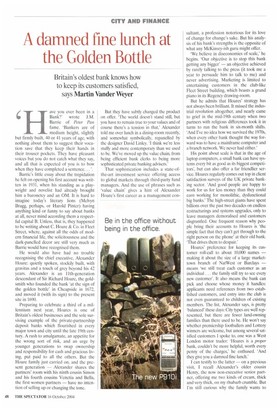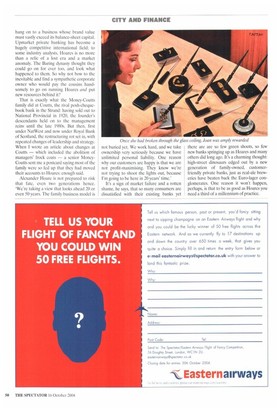A damned fine lunch at
the Golden Bottle
Britain's oldest bank knows how to keep its customers satisfied, says Martin Vander Weyer
aye you ever been in a Bank?' wrote J.M. Barrie of Peter Pan fame. 'Bankers are of medium height, slightly but firmly built, 40 or 41 years of age, with nothing about them to suggest their vocation save that they keep their hands in their trouser pockets. They have pleasant voices but you do not catch what they say, and all that is expected of you is to bow when they have completed a sentence... '.
Barrie's little essay about the trepidation he felt on opening his first account was written in 1931, when his standing as a playwright and novelist had already brought him a baronetcy and an OM. It is hard to imagine today's literary lions (Melvyn Bragg, perhaps, or Harold Pinter) having anything kind or funny to say about banks at all, never mind according them a respectful capital B. Unless, that is, they happened to be writing about C. Hoare & Co. in Fleet Street, where, against all the odds of modern financial life, the solicitousness and the dark-panelled decor are still very much as Barrie would have recognised them.
He would also have had no trouble recognising the chief executive, Alexander Hoare: quietly spoken, stockily built, with gravitas and a touch of grey beyond his 42 years. Alexander is an 11th-generation descendant of Sir Richard Hoare, the goldsmith who founded the bank 'at the sign of the golden bottle' in Cheapsicle in 1672, and moved it (with its sign) to the present site in 1690.
Preparing to celebrate a third of a millennium next year, Hoares is one of Britain's oldest businesses and the sole surviving example of the private-partnership deposit banks which flourished in every major town and city until the late 19th century. A rush to amalgamate, an appetite for the wrong sort of risk, and an urge by younger generations to swap ownership and responsibility for cash and gracious living, put paid to all the others. But the Hoare family just carried on, and the present generation — Alexander shares the partners' room with his ninth cousin Simon and his fourth cousins Venetia and Bella, the first women partners — have no intention of selling up or changing the tone. But they have subtly changed the product on offer. 'The world doesn't stand still, but you have to remain true to your values and of course there's a tension in that,' Alexander told me over lunch in a dining-room recently, and somewhat symbolically, repanelled by the designer David Linley. 'I think we're less stuffy and more contemporary than we used to be. We've moved up the value chain, from being efficient bank clerks to being more sophisticated private banking advisers.'
That sophistication includes a state-ofthe-art investment service offering access to global markets through third-party fund managers. And the use of phrases such as 'value chain' gives a hint of Alexander Hoare's first career as a management con sultant, a profession notorious for its love of change for change's sake. But his analysis of his bank's strengths is the opposite of what any McKinsey-ish guru might offer.
'We believe in diseconomies of scale,' he begins. 'Our objective is to stop this bank getting any bigger' — an objective achieved by rarely talking to the press (it took me a year to persuade him to talk to me) and never advertising. Marketing is limited to entertaining customers in the club-like Fleet Street building, which boasts a grand piano in its Regency drawing-room.
But he admits that Hoares' strategy has not always been brilliant. It missed the industrial revolution altogether, and nearly came to grief in the mid-19th century when two partners with religious differences took it in turns to run the bank in six-month shifts. 'And I've no idea how we survived the 1970s, when every other bank thought the way forward was to have a mainframe computer and a branch network. We never had either.'
His point about scale is that in the age of laptop computers, a small bank can have systems every bit as good as its biggest competitors', but can also offer a far friendlier service. Hoares regularly comes out top in client satisfaction surveys of the UK private banking sector. And good people are happy to work for us for less money than they could earn working for monolithic, dysfunctional big banks.' The high-street giants have spent billions over the past two decades on endless restructurings and systems upgrades, only to leave managers demoralised and customers disgruntled. One frequent reason why people bring their accounts to Hoares is 'the simple fact that they can't get through to the right person on the phone' at their old bank. 'That drives them to despair.'
Hoares' preference for keeping its customer roll-call to about 10,000 names — making it about the size of a large markettown branch of NatWest or Barclays — means 'we still treat each customer as an individual ... the family still try to see every new customer'. It also means the bank can pick and choose whose money it handles: applicants need references from two established customers, and entry into the club is not even guaranteed to children of existing members. The list, Alexander says, is pretty 'balanced' these days: City types are well represented, but there are fewer land-owning families than there used to be. He won't say whether premiership footballers and Lottery winners are welcome, but among several satisfied customers I spoke to, one was a West London motor trader: `Hoares is a proper bank, couldn't be more helpful, worth every penny of the charges,' he enthused. 'And they give you a damned fine lunch.'
I can testify to the latter — on a previous visit, I recall Alexander's older cousin Henry, the now non-executive senior partner, offering me two kinds of cream, thick and very thick, on my rhubarb crumble. But I'm still curious why the family wants to
hang on to a business whose brand value must vastly exceed its balance-sheet capital. Upmarket private banking has become a hugely competitive international field; to some industry analysts, Hoares is no more than a relic of a lost era and a market anomaly. The Baring dynasty thought they could go on for ever too, and look what happened to them. So why not bow to the inevitable and find a sympathetic corporate owner who would pay the cousins handsomely to go on running Hoares and put new resources behind it?
That is exactly what the Money-Coutts family did at Coutts, the rival posh-chequebook bank in the Strand: having sold out to National Provincial in 1920, the founder's descendants held on to the management reins until the late 1980s. But then, first under NatWest and now under Royal Bank of Scotland, the restructuring rot set in, with repeated changes of leadership and strategy. When I wrote an article about changes at Coutts — which included the abolition of managers' frock coats — a senior MoneyCoutts sent me a postcard saying most of the family were so fed up that they had moved their accounts to Hoares: enough said.
Alexander Hoare is not prepared to risk that fate, even two generations hence. We're taking a view that looks ahead 20 or even 50 years. The family business model is not buried yet. We work hard, and we take ownership very seriously because we have unlimited personal liability. One reason why our customers are happy is that we are not profit-maximising. They know we're not trying to shoot the lights out, because I'm going to be here in 20 years' time.'
It's a sign of market failure and a rotten shame, he says, that so many consumers are dissatisfied with their existing banks yet
there are are so few green shoots, so few new banks springing up as Hoares and many others did long ago. It's a charming thought: high-street dinosaurs edged out by a new generation of family-owned, customerfriendly private banks, just as real-ale breweries have beaten back the Euro-lager conglomerates. One reason it won't happen, perhaps, is that to be as good as Hoares you need a third of a millennium of practice.











































































































 Previous page
Previous page